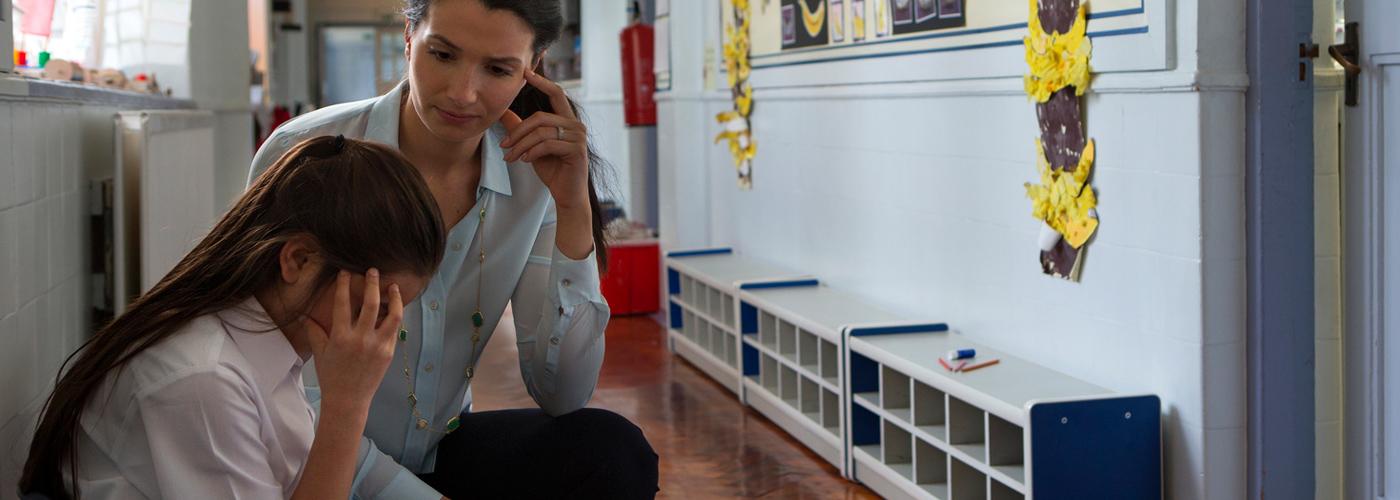Search Results for Behavioral Strategies
Through His Eyes: Natural and Logical Consequences at Home
Written By: Nancy Yeang | Resource Creation By: Bridget Morton | Design By: Sunny DiMartino
A father struggles with having his son, who has behavioral issues, understand the consequences of his actions. After a visit with a behavioral counselor, he learns about behavioral strategies, and also finds a window into his son’s world that allows him to better see and understand his perspective.
When Helping Can Hurt: Parent Enabling of Children with Special Needs
Written By: Agata Antonow | Resource Creation By: Bridget Morton | Design By: Sunny DiMartino
All parents want to help their children, and that can be especially true of parents who have children with special needs. Unfortunately, doing too much for your child may mean that they don’t learn some of the basic life skills they’ll need later in life.
Stop, Think, and Don’t React: Encouraging Parents to Be Proactive – Instead of Reactive or Confrontative – During Times of Conflict
Written By: Rebecca Thomas | Resource Creation By Bridget Morton | Design By Sunny DiMartino
Parents may often find themselves resorting to ultimatums, threats of punishment, removing privileges, or simply throwing up their hands when their child with special needs is having a meltdown and exhibits demanding or irrational behavior. Before exercising rigid authority, which often worsens challenging behavior, parents can instead use personal coping strategies to help themselves stay centered and focused so they remain calm in the face of conflict and, in turn, help their child become more calm as well.
Tracking the Clues: Using Functional Behavioral Assessment to Help Kids with Special Needs
Written By: Agata Antonow | Resource Creation By: Bridget Morton | Design By: Sunny DiMartino
Sometimes, children with special needs exhibit behaviors that seem random and are difficult to understand, leaving parents with the difficult task of figuring out what they mean and how to respond. In these situations, a set of tools known as Functional Behavioral Assessment (FBA) can help. Many parents have not heard of FBA, but counselors and therapists use this approach to systematically gather specific data about behaviors and decide on the appropriate intervention. FBA strategies can also be used in the home by parents struggling to understand specific behavior problems—and how to address them.
Prader-Willi Syndrome: It’s Not Just the Number on the Scale
Written By: Alison Hennessee | Resource Creation By: Bridget Morton | Design By: Sunny DiMartino
Parents of children with Prader Willi syndrome begin preparing for the food-related challenges associated with this disorder from day one. With a wealth of PWS literature on how to handle the constant food-seeking behaviors, parents learn to lock cupboards, manage meals, and limit pocket money. But other, less-discussed characteristics of PWS, particularly extreme and sometimes violent behavioral problems, can be just as difficult to handle. In this article, you’ll read about the challenges that Natalie faces as a result of her son Jason’s meltdowns and learn some strategies for handling these episodes.
The Emotional Turmoil Surrounding Extremely Aggressive and Violent Behavior in Your Child with Autism Spectrum Disorder
Written By: Amanda Ronan | Podcast Editing and Voiceover By: Heather Haynes | Design By: Sunny DiMartino
Parenting is always a journey that you can only try to be fully prepared for; however, parenting a child with autism spectrum disorder (ASD) can require an entirely different set of preparations. If you are the parent of a child with ASD, remember: you’re not alone—there are many options available for help.
Fostering Emotional Connections with Your Child Who Has Autism
Written By: Amanda Ronan | Resource Creation By: Bridget Morton | Design By: Christy Bui, Nathan Lueth, Sunny DiMartino
As the parent of a child with ASD, you experience the love and connection with your child in ways that are different, but are no less important and valuable. By learning techniques that suit your child’s needs, you are helping them to reach their full potential and giving yourself the opportunity to experience that emotional connection.
Scaling Emotional Hurdles in the Classroom with Emotional Scaling
Written By: Geoff Campbell | Resource Creation By: Bridget Morton | Design By: Christy Bui, Sunny DiMartino
Some children have difficulty understanding their emotions, which can sometimes lead to class-disrupting episodes of anger. By working closely with students and using strategies like emotional scaling, teachers and educators can help students better understand emotions, changes in intensity, and coping strategies, which often leads to increased self-control in the classroom.
Returning to Safety: Understanding and Reducing Self-Injurious Behavior
Written By: Julie Wallach | Resource Creation By: Bridget Morton | Design By: Sunny DiMartino
A seven-year-old girl's increasingly extreme self-injurious behavior requires understanding, thoughtful solutions, and careful planning. After a very challenging period of time, Lyla* receives the adult understanding, special education, and therapeutic care she needs to keep herself safe from her own harm.
Finding the Right Out-of-Home Placement for Your Child with Prader-Willi Syndrome
Written By: Alison Hennessee
Finding the right placement for your child with Prader-Willi Syndrome can be difficult. You may go through numerous homes before you find the one that is a fit for your child and that can help him or her in the best way possible. Read how one parent never gave up and sought out the help that she knew her child needed, in an environment that worked for him!